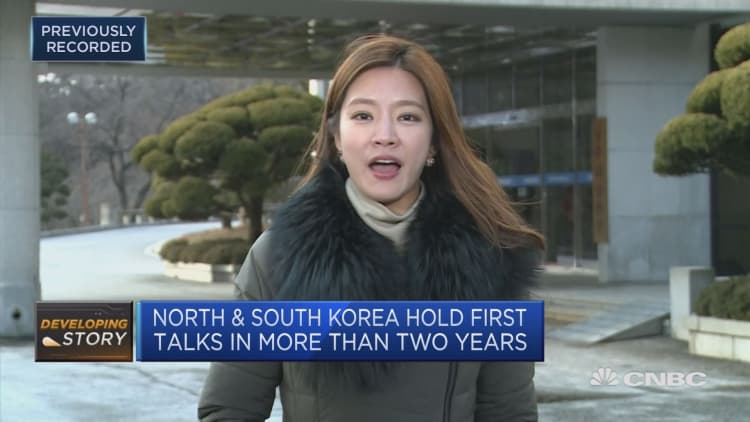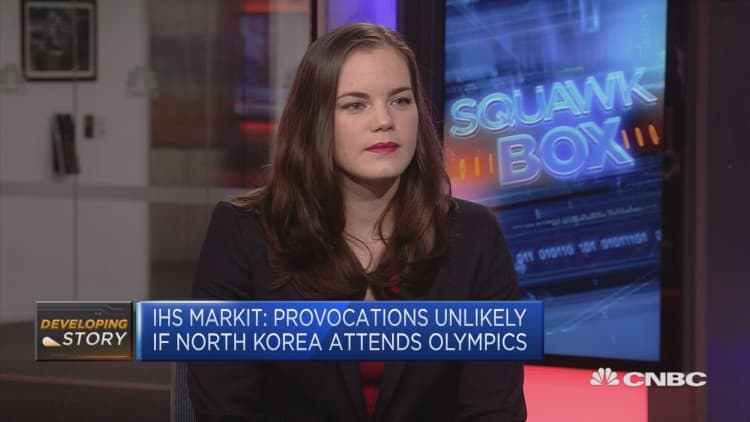
North Korea and South Korea appear to be embracing talks aimed at reducing tensions between the two neighbors and nemeses, just days after North Korea's leader threatened that he has a "nuclear button" ready on his desk.
Rare talks to improve inter-Korean relations appeared to be going well Tuesday, with North Korea saying that it will send as many athletes as possible to the Pyeongchang Winter Olympics in South Korea in February.
Talks in the border village of Panmunjom seemingly went so well that South Korean delegates suggested a "family reunion" for next month's Lunar New Year, to reunite relatives separated in both countries since the 1950-53 Korean War and one of only a number of sporadic reunions that have been held over the years.
South Korea also proposed inter-Korean military talks to reduce tensions on the Korean Peninsula and the South's Foreign Ministry said later on Tuesday that it was willing to consider temporarily lifting sanctions against North Korea to facilitate the Olympic visit.
North Korea's delegates meanwhile said in a keynote speech following the discussions that they hoped "to solve all inter-Korean issues through dialogue." News also came later on Tuesday that North Korea had completed technical maintenance needed to reopen a military hotline with South Korea.
High alert
Both sides concluded the first round of talks promising further discussions, though somewhat tellingly the North Korean delegation returned to the Panmungak (a North Korean building in the infamous demilitarized zone that separates North and South Korea) on the north side of the border for lunch, according to NBC News.
The fast-thawing relations are in stark contrast with the atmosphere at the start of the year, when North Korean President Kim Jong Un gave a New Year's Day address in which he said the Communist state's nuclear weapons could reach anywhere in the United States — an important ally with South Korea — and threatened that he has a nuclear button on his desk.
The address provoked a furious response from President Donald Trump who tweeted that he had a "much bigger and more powerful" nuclear button. The comments prompted fears that one or the other of the impulsive leaders could press their buttons, making this week's rapprochement even more extraordinary.
Alison Evans, deputy head of Asia-Pacific Country Risk, IHS Markit told CNBC Tuesday that the talks were a "positive change" but not foolproof.
"It's easy to be cynical about these talks and think that North Korea is perhaps trying to get something out of South Korea that it wants, but nonetheless there are reasons to be enthusiastic about these talks, they are the first ministerial talks since December 2015 and indeed daily contact between the South and North Korea governments and military has been cut since February 2016 … So I still think this is a positive change," Evans said.

"(However) I think there are reasons to still be on high alert," she said. "North Korea is open to talks and wants to improve relations with South Korea but I still think that North Korea is committed to developing its nuclear weapons and its ballistic missiles and in that vein, we're still likely to see more tests later this year."
More missiles, more problems
North Korea has largely been seen as a rogue state by the international community for its pursuit of a nuclear program and has been on the receiving end of international condemnation and sanctions.
It has attracted disapproval from most quarters (although China remains an ostensible ally) for its continued nuclear tests and missile launches, the international concern being that it could attach a nuclear warhead to a missile.
In September 2017, North Korea conducted its sixth and most powerful nuclear test since 2006. In all, Pyongyang has tested a total of 23 missiles since Trump took office, and 15 of those tests involved nuclear-capable ballistic missiles. The November 2017 launch of which appeared to be an intercontinental ballistic missile, or ICBM, flew further than any of Kim Jong Un's previous tests. The North claimed it could reach anywhere in mainland America.
The launches have ratcheted up tensions between the state and the U.S., with Trump warning North Korea after the November missile launch not to make a "fatal miscalculation."
Although North Korea has been given some priority by Trump, the U.S. has said it will only consider negotiations to end the nuclear weapons crisis if the state ceases to fire ballistic missiles, something that North Korea appears unlikely to give up.
Ian Bremmer, head of Eurasia Group, said on Monday that the latest talks were a positive sign, as well as North Korea's attendance at the Winter Olympics, but added that the state was likely to return to its missile testing.
"The North Koreans see their only effective defense against a more antagonistic and unpredictable United States as strengthening their proven deterrent capability against the American homeland. That means perfecting ICBM launch and reentry capabilities; which likely includes a (considerably more provocative) full horizontal test into the Pacific Ocean," Bremmer said in a note Monday.
"President Trump and, most recently, UN Ambassador Nikki Haley, say they'll accept no negotiations absent a willingness on the part of North Korea to cease tests (and potentially commit to denuclearization); North Korea sees significant expansion of its nuclear and ballistic missile programs as a precondition to any negotiation."


